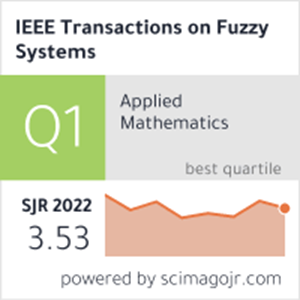具有未知Follower动态的多智能体系统的预定义时间模糊自适应最优安全一致性控制
IF 10.7
1区 计算机科学
Q1 COMPUTER SCIENCE, ARTIFICIAL INTELLIGENCE
引用次数: 0
摘要
本文研究了在两种类型的拒绝服务攻击(保持连接攻击和破坏连接攻击)下,具有未知追随者动态的多代理系统的安全领导-跟随共识。通过将时变分段函数与初始时刻的在线更新相结合,构造了一个具有预定义时间弹性的分布式观测器来实现对领导者状态的预定义时间观察。在保持连接的时间间隔内,所有agent都可以实现对leader的预定义时间观察。在连接中断期间,直接或间接访问领导者状态的代理仍然可以完成预定义时间的观察。针对在连接中断间隔内不能保证所有智能体都能观察到领导者状态的问题,提出了一种新的持续停留时间切换模型来描述两种攻击类型之间的切换,并基于多重Lyapunov函数方法导出了保证所有智能体都能观察到领导者状态的充分条件。在此基础上,提出了一种结合弹性分布式观测器和模糊强化学习策略的预定义时间滑模控制器,以保证领导-跟随的一致性。最后,通过一个分布式多机械臂系统的仿真和比较,验证了所提方法的有效性。本文章由计算机程序翻译,如有差异,请以英文原文为准。
Predefined-Time Fuzzy Adaptive Optimal Secure Consensus Control for Multiagent Systems With Unknown Follower Dynamics
This article investigates the secure leader–following consensus of multiagent systems with unknown follower dynamics under two types of denial-of-service attacks: connectivity-maintained and connectivity-broken attacks. A predefined-time resilient distributed observer to achieve predefined-time observation of the leader's state is constructed by incorporating a time-varying piecewise function with an online update at the initial instant. During the connectivity-maintained intervals, all agents can achieve predefined-time observation of the leader. During the connectivity-broken intervals, agents that have direct or indirect access to the leader's state can still accomplish the predefined-time observation. Since the leader state observation cannot be ensured for all agents during the connectivity-broken intervals, a new persistent dwell-time switching model is introduced to describe the switching between the two types of attacks, and novel sufficient conditions are derived to ensure that all agents can observe the leader's state based on multiple Lyapunov function approach. Furthermore, a predefined-time sliding mode controller combining the resilient distributed observer and fuzzy reinforcement learning strategy is proposed to ensure leader–following consensus. Finally, the effectiveness of the proposed method is validated through simulations and comparisons using a distributed multiple robot arm system.
求助全文
通过发布文献求助,成功后即可免费获取论文全文。
去求助
来源期刊

IEEE Transactions on Fuzzy Systems
工程技术-工程:电子与电气
CiteScore
20.50
自引率
13.40%
发文量
517
审稿时长
3.0 months
期刊介绍:
The IEEE Transactions on Fuzzy Systems is a scholarly journal that focuses on the theory, design, and application of fuzzy systems. It aims to publish high-quality technical papers that contribute significant technical knowledge and exploratory developments in the field of fuzzy systems. The journal particularly emphasizes engineering systems and scientific applications. In addition to research articles, the Transactions also includes a letters section featuring current information, comments, and rebuttals related to published papers.
 求助内容:
求助内容: 应助结果提醒方式:
应助结果提醒方式:


